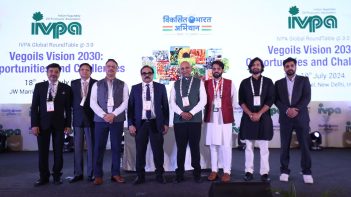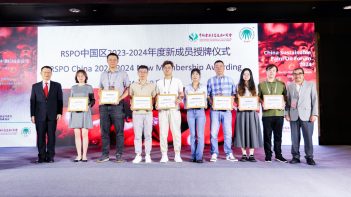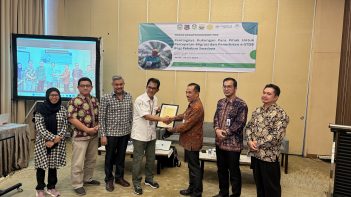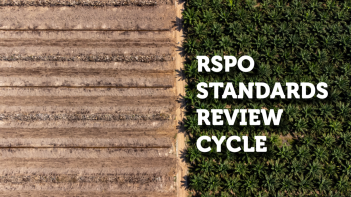Kick off initiative involves supporting an 8,000-hectare of palm oil plantation in North Sumatra towards RSPO certification
Jakarta, 26 April 2012 – PT Perkebunan Nusantara III Persero (PTPN III), a government-owned oil palm plantation company based in Indonesia, recently signed a Memorandum of Understanding (MOU) with Sustainable Trade Initiative (IDH), a Netherlands-based organization funded by the Dutch government and the Roundtable on Sustainable Palm Oil (RSPO).
The MOU aims to govern a program that provides assistance to the independent smallholders working in PTPN III’s 8,000-hectare plantation located within the regions of Simalungun and Labuhan Batu in North Sumatra to achieve RSPO certification. Under the MOU with PTPN III, IDH will provide a ‘match funding’ in the form of a grant, the same amount as initial investment made by PTTPN II and/or RSPO at the most.
In response to the MOU signing, RSPO Secretary General Darrel Webber stated, “The cooperation between IDH and PTPN III is not only the first in Indonesia; it is first of its kind in the world for smallholders. This partnership is established at an opportune time when Indonesia is recorded as the largest producer of CSPO in the world concurrently with a recent milestone when the RSPO achieved 6 million metric tonnes of CSPO production. The RSPO takes this opportunity to applaud our Indonesian grower members for their continuous drive towards sustainability.
“The challenges confronting the responsible cultivation oil palm continue to be multifaceted. But this underscores even more so the enormous importance of sustainable practices in transforming markets. The RSPO thanks and commends PTPN III and IDH for coming forward with this pioneering exercise. As a pilot project, the PTPN III program will hopefully create a path for other palm oil players in all markets around the world who wish to be certified to emulate.”
PTPN III’s CEO, Megananda Daryono, pledged his commitment to the MOU and appreciates IDH and RSPO’s continued commitment to fostering independent smallholders so that they can be equipped with adequate knowledge, skills and funding to manage their plantations sustainably. “It is PTPN III’s commitment, as a state-owned enterprise, to improve the welfare of the independent growers who are important partners and stakeholders in our company. I hope that the cooperation with IDH and RSPO will help the independent smallholders improve their productivity, income generation and, also, access to global markets and funding. The MOU well serves our corporate philosophy to develop a sustainable and eco-friendly agribusiness.”
IDH’s Program Director for Soybean and Palm Oil, Jan Nicolai, stated, “PTPN III is one of the front runners of oil palm plantations in Indonesia that is committed towards sustainable palm oil production, including those come from independent smallholders. IDH sees efforts in incorporating independent smallholders into RSPO certification scheme as an immense challenge, but nevertheless one that needs to be started. As an organization that manages fund from the government and private sectors in the Netherlands, IDH considers this initiative as a strategic commitment through active participation and support from the market towards the shift to full production and use of Certified Sustainable Palm Oil (CSPO)”.
–END—
About IDH
Sustainable Trade Initiative (IDH) aims to improve the sustainability of international supply chains. To this end, IDH works towards tackling social, ecological, and economical in developing countries. The initiative is a multi-stakeholder process in which actors from both production and consumers countries actively participate. IDH searches for links with other chain initiatives, both in the Netherlands and in other countries. IDH builds programs in the sectors tropical timber, soy, natural stone, cocoa, tea, tourism, aquaculture, cotton, spices, electronics and coffee.
About the 2011 RSPO CSPO Growth Interpretation Narrative (2011 GIN)
The latest 2011 RSPO CSPO Growth Interpretation Narrative (GIN), the first and only report in the market on certified sustainable palm oil aimed at analyzing, shaping and facilitating commitment and discussions towards sustainable palm oil.) reported the upward trend in the supply and sale of sustainable palm oil and is available on: https://rspo.org/wp-content/uploads/2011 RSPO CSPO GIN_web.pdf . A summary of quick facts is also available on https://rspo.org/wp-content/uploads/QUICKFACTS-APR12.pdf.
About RSPO
In response to the urgent and pressing global call for sustainably produced palm oil, the Roundtable on Sustainable Palm Oil (RSPO) was formed in 2004 with the objective of promoting the growth and use of sustainable oil palm products through credible global standards and engagement of stakeholders. The seat of the association is in Zurich, Switzerland, while the secretariat is currently based in Kuala Lumpur with a satellite office in Jakarta.
RSPO is a not-for-profit association that unites stakeholders from seven sectors of the palm oil industry – oil palm producers, palm oil processors or traders, consumer goods manufacturers, retailers, banks and investors, environmental or nature conservation NGOs and social or developmental NGOs – to develop and implement global standards for sustainable palm oil.
Such multi-stakeholder representation is mirrored in the governance structure of RSPO such that seats in the Executive Board and project level Working Groups are fairly allocated to each sector. In this way, RSPO lives out the philosophy of the “roundtable” by giving equal rights to each stakeholder group to bring group-specific agendas to the roundtable, facilitating traditionally adversarial stakeholders and business competitors to work together towards a common objective and making decisions by consensus.
Keep reading

Save the Date: The 21st General Assembly (GA21) of RSPO Members
Interim Measure for Requirements 5.1.5 and 5.1.6 of RSPO Rules on Market Communication and Claims 2022

RSPO Partners with Indian Vegetable Oil Producers’ Association (IVPA) to Promote Sustainable Cultivation and Palm Oil Imports in India
Call for Expression of Interest: Independent Investigation of a Complaint

2024 China Sustainable Palm Oil Forum Calls for Bold Action on Supply Chain Sustainability
Reminder: Important Updates on Shared Responsibility

Smallholder Inclusion in Indonesia: Over 1,000 Farmers Registered in RSPO Pilot Districts




